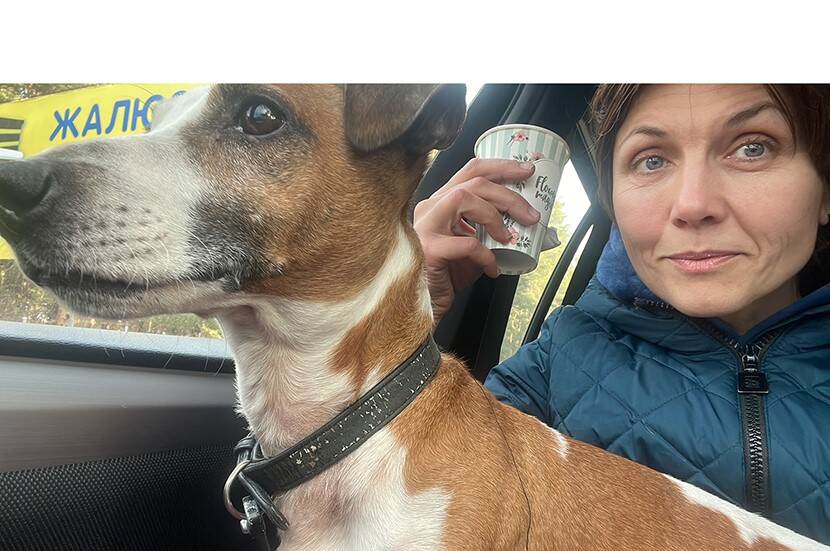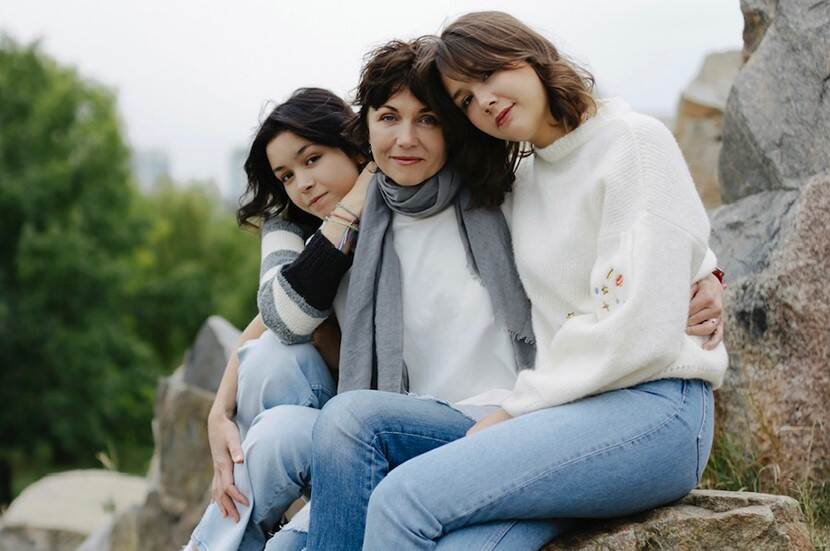Psychosocial support for Ukrainian refugees: more than trauma counselling alone
The war in Ukraine has prompted the largest refugee flows Europe has seen since the Second World War. Millions of people have fled to neighbouring countries like Poland, Slovakia and Hungary, where they are receiving emergency assistance. Ganna Goloktionova, herself a refugee from Kyiv, coordinates psychosocial support for Ukrainians.

What do you do as an expert in mental health and psychosocial support (MHPSS)?
‘The refugee flows at the start of the war created an emergency situation in Ukraine’s neighbouring countries. Millions of people fled to Poland. Many travelled on to other European countries, but more than a million Ukrainians stayed. Poland had to set up an unprecedented aid operation. My task at the UN refugee agency UNHCR was to coordinate emergency psychosocial support. Good coordination ensures MHPSS is integrated into all aspects of emergency assistance and prevents fragmentation and duplication of work.’
When they hear the term psychosocial support, people will often think of the psychiatrist’s couch. Or trauma counselling for war refugees. Is that an accurate picture?
‘MHPSS is more than that. I often say you can go to a one-hour therapy session with a psychologist, but what about those other 23 hours in the day? Mental health and psychosocial support is mainly about easing the strain and restoring social structures. Making sure people have a decent place to sleep. And access to medical care and education for their children. So this form of support is very practical too. Removing the stress of having to flee the country and the initial shock of war, that’s what it starts with. Anyone who needs further psychosocial or psychiatric help must of course have access to it. But I think most Ukrainians don’t need trauma therapy. They’ve been hit hard by the war, but they’re strong and resilient enough to get through this.’
You’re a refugee yourself. Can you tell us what happened to you?
‘On 24 February Russia attacked Ukraine. I was living in Kyiv, which was targeted by cruise missiles that very same day. My sixteen-year-old daughter and I, and our dog Tobi, left for Poland by car the following night. I wanted my family to be together, somewhere safe. My other daughter, who is 14, was visiting family in Austria. The 800-kilometre journey took us a week, and we arrived on 1 March.’
And less than two weeks later, you started working as an expert for Dutch Surge Support (DSS) for MHPSS?
‘I had already applied for a similar job in Lithuania, working with refugees from Belarus. On the way to Poland, I received the news that I'd got the job, but I decided not to accept it because I wanted to help my own country. The Netherlands Enterprise Agency (RVO) understood my decision. That same week, a new vacancy came up, for an MHPSS expert with the UN refugee agency UNHCR in Warsaw, helping Ukrainian refugees. So I started working there.’
Has this work helped you deal with your own experiences and start to rebuild your life?
‘Absolutely. Structure and certainty are important to me and my children too. I have a place to live, a job and income. I can use that as a basis to start looking ahead again. And I get a lot of satisfaction from being able to help other Ukrainians through my work. My two daughters are also settling down and working towards their future. Like almost 80% of Ukrainian children, they are following online lessons taught from Ukraine, to keep the bond with their home country intact. My eldest hopes to go and receive her secondary school diploma in Kyiv next spring.’
The images of Polish people taking in Ukrainians at the border were shown the world over. What role does MHPSS play in this informal assistance?
‘When the first refugees reached Poland in February, the efforts of the Polish people were heartwarming. They were there to meet them at the border, with food, drink and clothing. They offered places to sleep and drove families to other cities or even other countries. But, just like refugees, volunteers need to be safe and healthy. That’s why the MHPSS programme teaches volunteers how to cope with the stress they experience themselves, and how to recognise psychosocial problems in refugees. It’s like a first aid course for psychosocial support. You learn how to support someone in a stressful situation. And you learn how to listen and give advice without judging.'
What do you, as an MHPSS expert, want to achieve in the long run?
‘A permanent place for mental health and psychosocial support in all forms of emergency assistance. But it always requires a tailored approach. Every culture deals with the subject differently. It’s not always a taboo subject, but more often there’s a sense of shame. In Central and Eastern Europe, for example, mental health is still often associated with grim, Soviet-era institutions deep in the forest.’
This month you started working in Denmark with the International Federation of Red Cross and Red Crescent Societies. Will you still be involved with Ukraine?
‘Fortunately, yes. In my new job, too, I'll be working as an MHPSS expert to provide assistance to Ukrainian refugees in the countries that have taken in so many of my fellow countrymen and women.’

When do you hope to go back to Ukraine?
‘In September I visited my parents, in the central part of the country. It was a bit scary, but just about safe enough. It was great to be home, but at the same time there was a feeling of loss and sadness. Everyone is worried about how they will get through the winter. My dream is to go to Kyiv next spring with my daughter so she can receive her secondary school diploma.’
DSS MHPSS
Ganna has been seconded by the DSS MHPSS (Dutch Surge Support for Mental Health and Psychosocial Support) programme, which started in 2020 following an initiative by the Ministry of Foreign Affairs. DSS MHPSS is carried out by the Netherlands Enterprise Agency (RVO), in collaboration with the chairs of the MHPSS working group of the Inter-Agency Standing Committee (IASC). They provide advice to humanitarian aid organisations on mental health and psychosocial support.
See the website for more information about the DSS MHPSS programme.